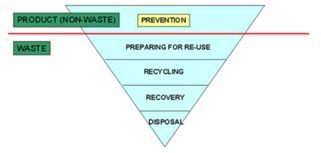Waste Framework Directive
Directive 2008/98/EC on waste (Waste Framework Directive) sets the basic concepts and definitions related to waste management, such as definitions of waste, recycling, recovery.
The Waste Framework Directive explains when waste ceases to be waste and becomes a secondary raw material (so called end-of-waste criteria), and how to distinguish between waste and by-products. The Directive lays down some basic waste management principles: it requires that waste be managed without endangering human health and harming the environment, and in particular without risk to water, air, soil, plants or animals, without causing a nuisance through noise or odours, and without adversely affecting the countryside or places of special interest. Waste legislation and policy of the EU Member States shall apply as a priority order the following waste management hierarchy:

The Directive introduces the "polluter pays principle" and the "extended producer responsibility". It incorporates provisions on hazardous waste and waste oils, and includes two new recycling and recovery targets to be achieved by 2020: 50% preparing for re-use and recycling of certain waste materials from households and other origins similar to households, and 70% preparing for re-use, recycling and other recovery of construction and demolition waste. The Directive requires that Member States adopt waste management plans and waste prevention programmes.
The European Chemicals Agency (ECHA) plans to establish a database on articles containing Candidate List Substances of Very High Concern (SVHC) – as e.g. the heavy metal lead is – under the Waste Framework Directive by 2021. In this context ECHA published the following on their website on 11th July 2018:
ECHA will establish a new database on the presence of hazardous chemicals in articles by the end of 2019 for waste treatment operators and consumers. The database will comprise information submitted by companies producing, importing or selling articles that contain Candidate List substances. Companies need to submit this information by the end of 2020.
ARGE is monitoring the development and will provide its members with information – and if feasible – with support in due time.
